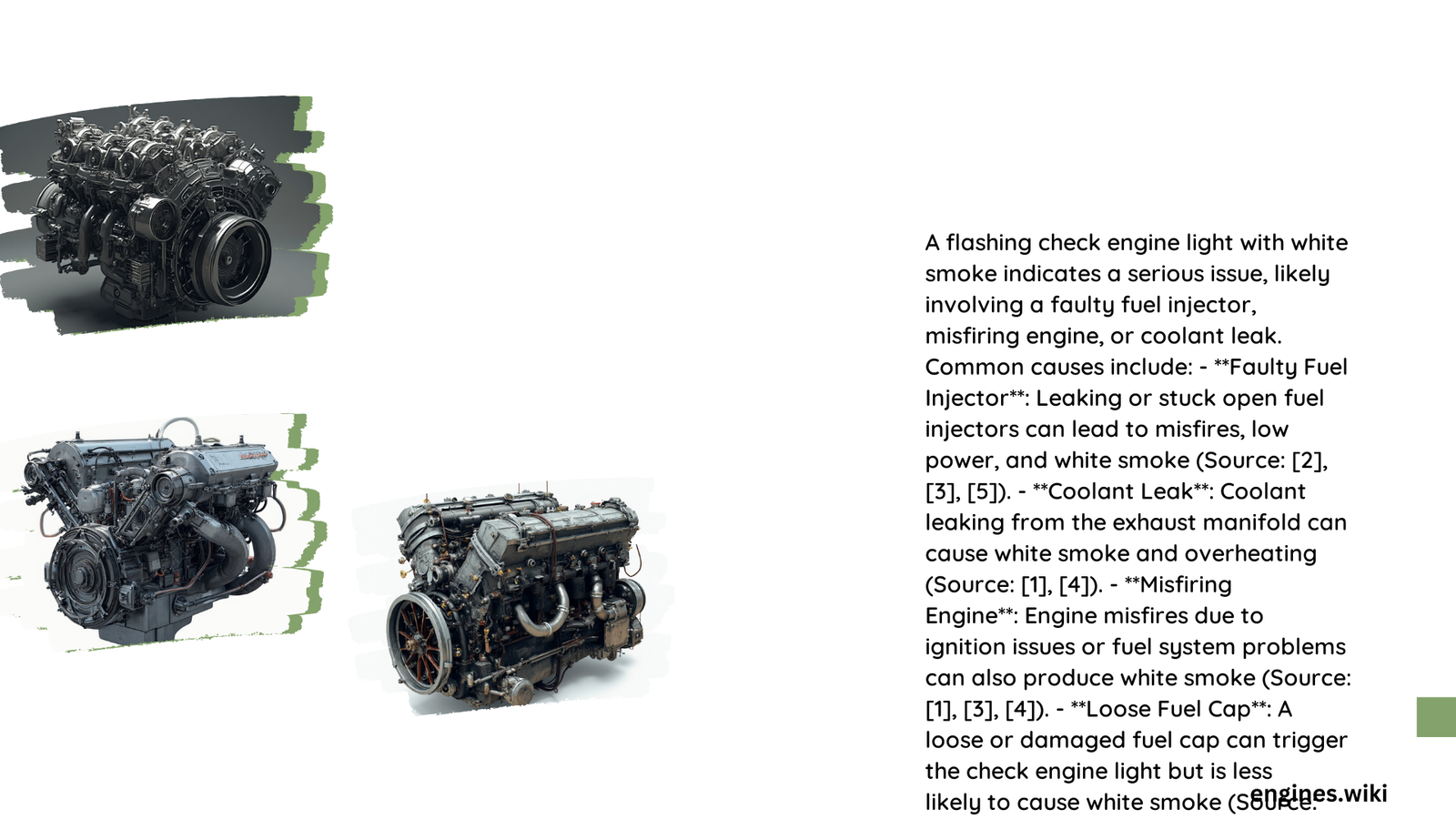A flashing check engine light accompanied by white smoke from the exhaust is a serious warning sign of potential engine damage. This combination often indicates coolant leaking into the combustion chamber or severe engine misfires. Immediate attention is crucial to prevent catastrophic engine failure. Common causes include a blown head gasket, cracked engine block, or fuel system issues. Prompt diagnosis and repair are essential to avoid costly engine damage.
What Are the Main Causes of a Flashing Check Engine Light and White Smoke?
The combination of a flashing check engine light and white smoke from the exhaust is a clear indicator of serious engine problems. Here are the primary causes:
- Coolant Leak:
- Blown head gasket
- Cracked engine block
-
Damaged cylinder head
-
Severe Engine Misfire:
- Ignition system problems (faulty coil pack, bad spark plugs)
- Air-fuel mixture issues (vacuum leak, malfunctioning fuel injectors)
- Engine mechanical problems (failed lifter, jumped timing chain)
- Sensor malfunctions (faulty mass airflow sensor, crankshaft sensor)
-
Wiring issues
-
Fuel Injector Failure:
- Stuck-open injector causing unburned fuel in exhaust
How Can I Diagnose the Problem?

Proper diagnosis is crucial for addressing the issue effectively. Follow these steps:
- Use an OBD II Scanner:
- Retrieve trouble codes
- Look for misfire codes (P0300-P0308)
-
Check for fuel system pressure codes (e.g., P008B)
-
Perform a Visual Inspection:
- Check for coolant leaks
- Inspect the radiator and coolant overflow tank for bubbles
-
Examine the exhaust manifold for leaks or cracks
-
Test Sensors:
- Oxygen sensor
- Mass airflow sensor
-
Crankshaft sensor
-
Conduct a Compression Test:
-
Check for compression loss due to valve problems or blown head gasket
-
Analyze Engine Oil:
-
Look for signs of coolant or fuel contamination
-
Perform an Exhaust Gas Analysis:
- Check for excessive hydrocarbons indicating misfires or fuel system issues
What Tools Are Needed for Diagnosis?
To properly diagnose the issue, you’ll need the following tools:
| Tool | Purpose |
|---|---|
| OBD II Scanner | Retrieve trouble codes and monitor real-time data |
| Multimeter | Check electrical circuits and sensor outputs |
| Compression Test Kit | Test cylinder compression |
| Leak-Down Test Kit | Identify internal engine leaks |
| Exhaust Gas Analyzer | Analyze exhaust composition |
What Are the Effective Solutions and Their Estimated Costs?
Once diagnosed, here are potential solutions and their estimated costs:
- Head Gasket Replacement:
- Cost: $1,000 – $3,000+
-
Time: 5-15 hours
-
Fuel Injector Replacement:
- Cost: $200 – $1,000 per injector
-
Time: 2-5 hours
-
Spark Plug Replacement:
- Cost: $100 – $300
-
Time: 1-3 hours
-
Catalytic Converter Replacement:
- Cost: $500 – $2,000+
- Time: 2-5 hours
How Serious Is White Smoke with a Flashing Check Engine Light?
The combination of white smoke and a flashing check engine light is a severe warning sign:
- White Smoke: Typically indicates coolant leaking into the combustion chamber
- Flashing Check Engine Light: Signals severe misfires or critical engine issues
- Potential Damage: Can lead to catalytic converter failure and complete engine breakdown
- Urgency: Immediate attention and repair are crucial to prevent catastrophic engine failure
What Should I Do If I Experience This Issue?
If you encounter a flashing check engine light and white smoke:
- Stop driving immediately to prevent further damage
- Have the vehicle towed to a reputable mechanic or dealership
- Do not attempt to drive long distances or ignore the warning signs
- Be prepared for potentially significant repair costs
- Consider getting a second opinion if the diagnosis involves major engine work
Remember, addressing this issue promptly can save you from more extensive and expensive repairs in the long run.
